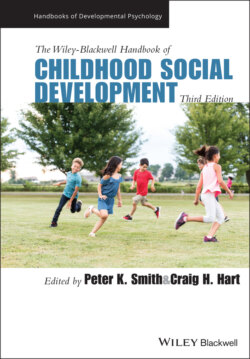Читать книгу The Wiley-Blackwell Handbook of Childhood Social Development - Группа авторов - Страница 95
School and Parent Partnerships: Vehicles for Socialization?
ОглавлениеThe politicization of parenting and the relocation of child development and socialization within the family have changed the relationship between families and schools, particularly the role of parents and teachers in child socialization, blurring the boundaries between schools and families. The roles of parents and teachers used to be distinct in that parents were responsible for providing social, emotional, and physical nurturance and meeting their children’s needs and teachers for educating them by providing an intellectually stimulating environment and access to educational resources and expertise (Hartas, 2014). The 2004 Children’s Act in the United Kingdom placed the responsibility for children’s happiness and wellbeing with the teachers whereas parents were encouraged, and often expected, to support their children with learning by reading and doing homework with them and offering them a wide range of educational experiences. The blurring of home–school boundaries undermines the roles parents and teachers play in socializing children. Teachers are now expected to deal with matters, traditionally assigned to parents’ roles, such as feeding problems, independent living skills, self‐esteem support, whereas parents are asked to support teachers with discipline and the development of pre‐literacy skills as well as reading and homework support and organization of enrichment activities. Increasingly parents feel that their children’s academic socialization has been outsourced to them.
School–parent relationships are based on the assumption that schools and parents work together as equal partners. More often than not, schools expect parents to work in ways that their activities align with the schools’ organizational goals. When parents deviate, there are systems in place (e.g., parenting contract and orders, mandatory parent classes, fines and imprisonment) to govern and “nudge” them to make the “right” choices for their children; predetermined choices that align with the schools’ agenda and priorities. The unequal partnerships between parents and schools have implications for children’s socialization. Guidance on child development and socialization from teachers and other professionals (e.g., family experts) has come to supersede that of the parents. This is reflected in the rise of a therapeutic culture in schools which shifts views of children as active agents to vulnerable children, what Ecclestone and Hayes described as the “diminished subject” (2009), who are exposed to multiple risks (mostly located within the family) for which schools have to step in to manage. In the same vein, the autonomy of family is compromised because child social and academic outcomes become part of an externally imposed accountability agenda where trust and kindness are capitalized to achieve predetermined outcomes. This presents children’s education as an individualistic pursuit, diverting education from its original humanistic purpose.
Parents have internalized these changes and feel primarily responsible for their children’s academic socialization and learning. This is reflected in the increasing global demand for private tutoring and for paid‐for enrichment/cultural activities to offer children an edge in the competition for educational outcomes (Doherty & Dooley 2018). Their expansion is driven by consumer demand, family policy, and parenting anxiety (Holloway & Pimlott‐Wilson, 2014; Vincent & Ball, 2007). They are emboldened by intensive parenting cultures in which middle‐class parents seek to ensure that their children have enjoyable and productive childhoods during which they develop social and cultural capital valuable in adult life (Lareau, 2002; Vincent & Ball, 2007). The instrumentality of these socialization trends have implications for how children spend their time, articulated in terms of the “overscheduled child” (Katz, 2008, p. 11) or the “Renaissance child” (Vincent & Ball, 2007, p. 888) who often participates in a mix of sporting and cultural activities in parallel with school. As parents become increasingly concerned about political‐economic futures, especially in light of current crises, and downward social mobility in western societies, they are keen to offer paid‐off enrichment activities designed to bolster their children’s competitiveness and skills valued by the market. Parents’ concerns and decisions are rational and reflect the politicization of parents and their intensified role in enhancing their children’s life chances (Holloway & Pimlott‐Wilson, 2014).
The implications of changes in the roles and obligations of parents and teachers are not only contained in children’s socialization and learning but also extend to parent confidence and teacher professionalization. Parents, especially those in poverty, feel less confident to fulfil their roles as “edu‐parents” whereas some teachers feel uneasy to interfere with the intimate sphere of family life. Furthermore, home–school partnerships are questioned as to whether they are democratic in terms of promoting a two‐way participation, willingness to share power, and true collaboration between parents and teachers. Often these partnerships are criticized as mechanisms for outsourcing education to parents and holding them responsible for their children’s educational failures (Wyness, 2020). Also, in a market‐driven education, parents are the consumers who exercise choice and expect to receive the educational services they are entitled to. However, even within this consumerist model, parents exercise consumer power but not the power of a joint decision maker. Ultimately, to rely on parents to provide education and academic socialization to their children is to exacerbate disadvantage and limit equality of opportunity.
